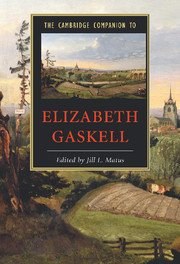Book contents
- Frontmatter
- 1 Introduction
- 2 The life and letters of E. C. Gaskell
- 3 Mary Barton and North and South
- 4 Cranford and Ruth
- 5 Elizabeth Gaskell’s The Life of Charlotte Brontë
- 6 Sylvia’s Lovers and other historical fiction
- 7 Cousin Phillis, Wives and Daughters, and modernity
- 8 Elizabeth Gaskell’s shorter pieces
- 9 Gaskell, gender, and the family
- 10 Elizabeth Gaskell and social transformation
- 11 Unitarian dissent
- 12 Gaskell then and now
- Guide to further reading
- Index
- Series List
12 - Gaskell then and now
Published online by Cambridge University Press: 28 May 2007
- Frontmatter
- 1 Introduction
- 2 The life and letters of E. C. Gaskell
- 3 Mary Barton and North and South
- 4 Cranford and Ruth
- 5 Elizabeth Gaskell’s The Life of Charlotte Brontë
- 6 Sylvia’s Lovers and other historical fiction
- 7 Cousin Phillis, Wives and Daughters, and modernity
- 8 Elizabeth Gaskell’s shorter pieces
- 9 Gaskell, gender, and the family
- 10 Elizabeth Gaskell and social transformation
- 11 Unitarian dissent
- 12 Gaskell then and now
- Guide to further reading
- Index
- Series List
Summary
Writing to an unknown correspondent in 1862, Gaskell insisted that ''I do not think I ever cared for literary fame; nor do I think it is a thing that ought to be cared for. It comes and it goes'' (L, 694). The story of Gaskell's rise and fall in literary status is well known. That literary status has alternately gathered strength and dissipated in the near 150 years since her sudden death in 1865 from heart failure aged fifty-five, at the peak of her writing career: she was feted during her lifetime but fell into obscurity after her death. Yet, although the narrative arc of Gaskell's reputation is well charted, it nonetheless bears closer scrutiny.
In the months immediately following her death, Gaskell's contemporaries cared a great deal about her fame. Newspaper obituaries and periodical press summations of her writing laid the groundwork for a reputation that was later chased into the shadows by modernism's onslaught on the Victorians, and remained remarkably unchanged until revisited in the 1960s and 1970s by materialist and feminist critics. Gaskell's reputation has since regained lost ground, and been given nuance and complexity - as much the result of shifting critical investments in literary studies as of the fact that literary reputation itself is now the subject of critical inquiry. Gaskell's reputation continues to have its champions and detractors. But most distinctive in the push and pull defining Gaskell's critical fortunes has been the way that her reputation has been shaped until very recently by a robust critical impulse to define her writing achievements by a single book.
- Type
- Chapter
- Information
- The Cambridge Companion to Elizabeth Gaskell , pp. 178 - 191Publisher: Cambridge University PressPrint publication year: 2007
- 1
- Cited by



